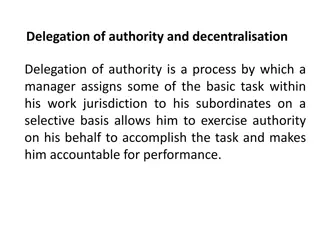Role of Effective Delegation in Personnel Management in Education
Delegation plays a crucial role in management within the educational system by empowering individuals to carry out specific tasks. This process involves assigning responsibility and authority to others while remaining accountable for the outcome. Understanding the benefits, process, reasons for reluctance, and factors contributing to effective delegation are essential for efficient personnel management in education.
Download Presentation

Please find below an Image/Link to download the presentation.
The content on the website is provided AS IS for your information and personal use only. It may not be sold, licensed, or shared on other websites without obtaining consent from the author. Download presentation by click this link. If you encounter any issues during the download, it is possible that the publisher has removed the file from their server.
E N D
Presentation Transcript
ROLE OF EFFECTIVE DELEGATION IN MANAGEMENT OF PERSONNEL IN EDUCATIONAL SYSTEM by O. G. Dr. Dr. Adeware Adeware O. G Provost/CEO, De Potter College of Health Technology, Ogun State, Nigeria.
OVERVIEW Delegation as it mean Process of Delegation Benefits of Delegation Reasons why some Managers do not Delegate Factors that can lead to effective delegation Why some Subordinate do not accept Delegation Delegation Level Creed of Delegation
DELEGATION AS IT MEAN Delegation is the assignment of any responsibility or authority to another person (normally from a manager to a subordinate) to carry out specific activities. It is an act of empowering another person to perform an activity. Very often it amounts to giving control, authority, a job or a duty to another person. however, the person who delegated the work remains accountable for the outcome of the delegated work.
Process of Delegation Assess and define the task to be delegated Select the delegatee: This has to do with the person who is to be given the task. Explain the task to the delegatee. If necessary, train the person Provide necessary resources and other forms of empowerment.
Benefits of Delegation Delegation opportunities dramatically productivity and workplace wellbeing. gives your learn can employees and alter to and grow both Increases your earnings: This is because, by assigning duties to several people you can attend to more clients and do many things at the same time. Delegation encourages creative problem- solving
Benefits of Delegation contd. Delegation is one of the methods of managing time. Delegation encourages communication between levels of management. Delegation is a form of involvement and participation in the work process. People who are involve in decision making and in carrying out the assignment feel good about their work. This leads to commitment, high moral and motivation.
Reasons why some Managers do not delegation They are afraid that someone might do the task more effectively. They are afraid that somebody else may over shadow them. They may truly believe that they are the only ones who really know how to do the task well. Some managers do not delegate because they see the task as a key part of their authority or status. Some managers may not realize that delegation contributes to employees development.
Reasons why some Managers do not delegation Contd. They may be afraid that their boss, customers or client will blame them if the task is not performed well They may simply enjoy doing the task that is to be delegated. Some managers do not delegate because they are involved in corrupt practices in the course of their work, and so they are afraid that delegating task may expose them. They are afraid that the subordinates may outshine them.
NOTE You can see clearly that fear lies behind most reasons why some managers may not want to delegate. This is a psychological factor that can be eliminated by training and coaching of those concerned.
Factors that can lead to effective delegation Define the Assignment Select the person capable of doing the job Maintain open line of communication Training of subordinate Delegate authority that commensurate to result expected Establish proper control
Why Reluctant to accept Delegation some Subordinates are Lack of Trust in Themselves: They have no confidence in themselves. They think they will bungle the job. Difficulty in Decision-Making: Carrying out degelated task involves a series of decision making. Some subordinates lack the courage to decide. Such subordinates tend to run back to their boss for any kind of decision making. In a way, they are practicing reverse delegation which should not be encouraged. Poor Rapport between Superior and Subordinate: This can lead to resistance to accepting delegation. Fear of Criticism: They are afraid that they may make a mistake and become open to criticism.
Is there anything that may not be delegated? YES You may delegate any task and authority to your subordinates but in the final analysis, you cannot delegate responsibility. You cannot say: Oh, it was MR. ABC that did this or that. No .. You are accountable, responsible for whatever is the outcome of the delegation. You cannot pass the buck!
When delegating a task to someone, it is helpful to let the person know the level of authority you are allowing him or her to exercise. The levels of delegation may be viewed as boundaries of authority set out for the person. There are five possible levels of authority in delegation.
DO EXACTLY WHAT I TELL YOU. DO NOT DEVIATE
Go and research the task. Come back to me for a decision, then I will tell you what to do.
Go and research the task. Outline possible options and make recommendations. I will decide and tell you to move forward.
Go and carry out the task. Make all decisions and tell me what you have done
Go and carry out the task. Make all decisions as you think best. I have the trust and full confidence in you
As leaders and managers, we have to delegate at the various levels. Selecting the level depends on the situation and on training and experience of the individual that is being delegated to.
Creed of Delegation Mutual trust in sharing of responsibilities with subordinate. Analysing the job to be done (Job description). Choosing the right person for the job (Job Analysis). Transfer of authority, decision making and responsibility. Creating a sense of obligation and accountability. Willingness and ability to tolerate initial failings of the subordinate. Willingness and ability to train. Delegate but do not abdicate.
References Bell, R. L. and Bodie, N. D. (2012). Delegation, authority and responsibility: Removing the rhetorical obstructions in the way of and paradigm. Journal of Leadership, accountatbility and Ethics Kansas (2012). Effective delegation. Retrieved May 5 2017 from http//www.kansas4h-.org/resources/4-h- library/4-h Parikh, V. (2017). Advantages of delegation. Retrieved April 16, 2017 from http//www.letslearnfinance.com/ advantages-disadvatages-of-delegation.html























